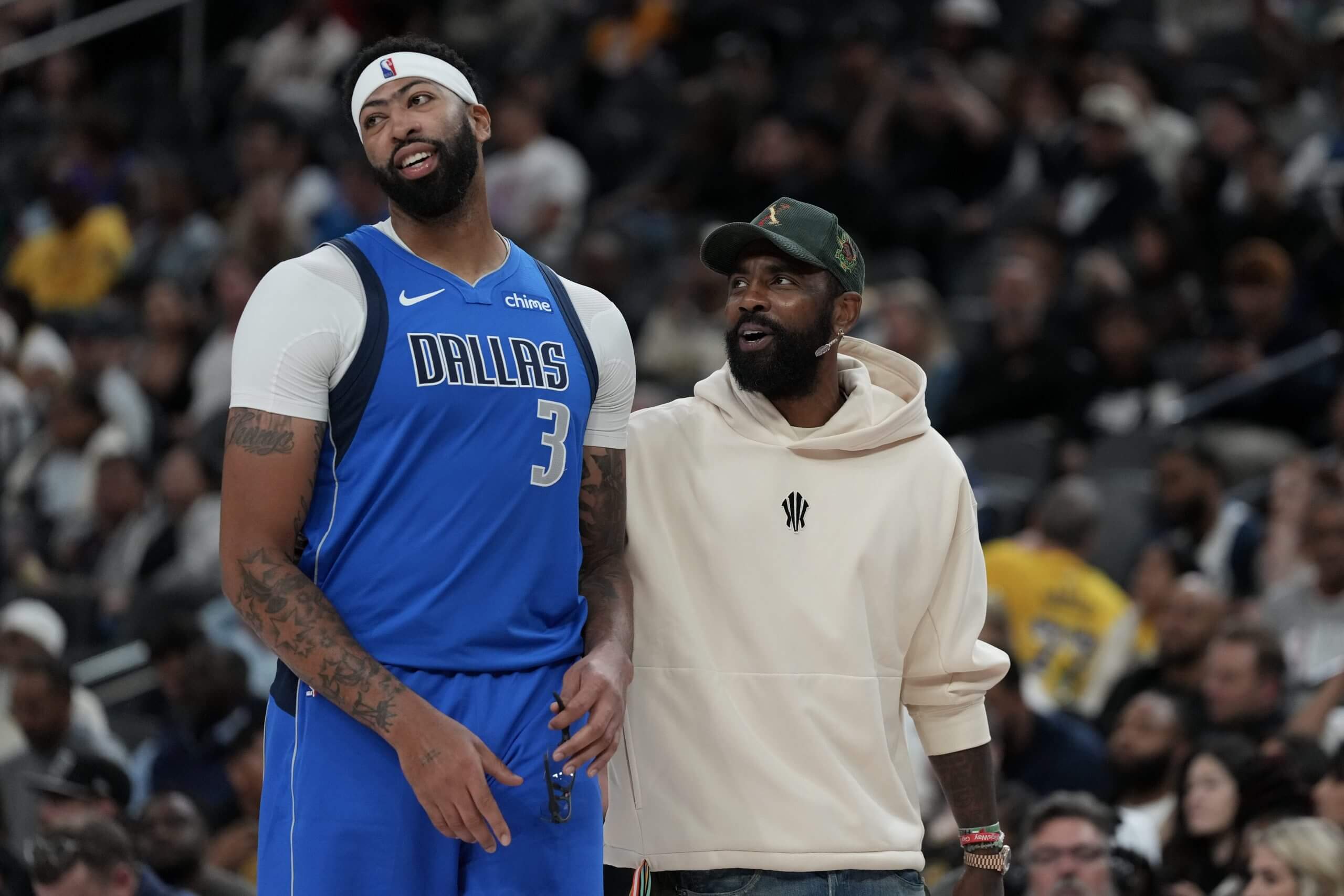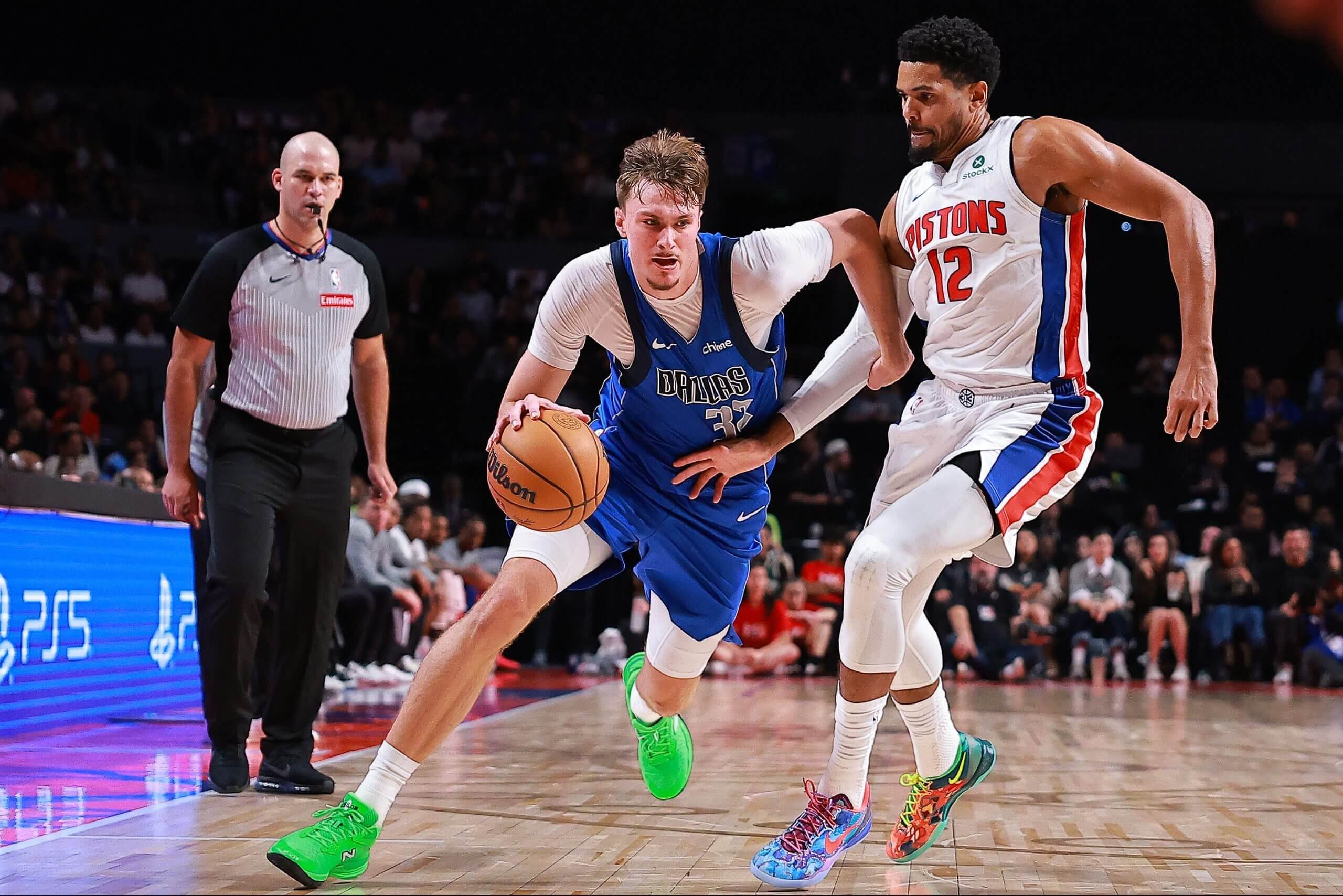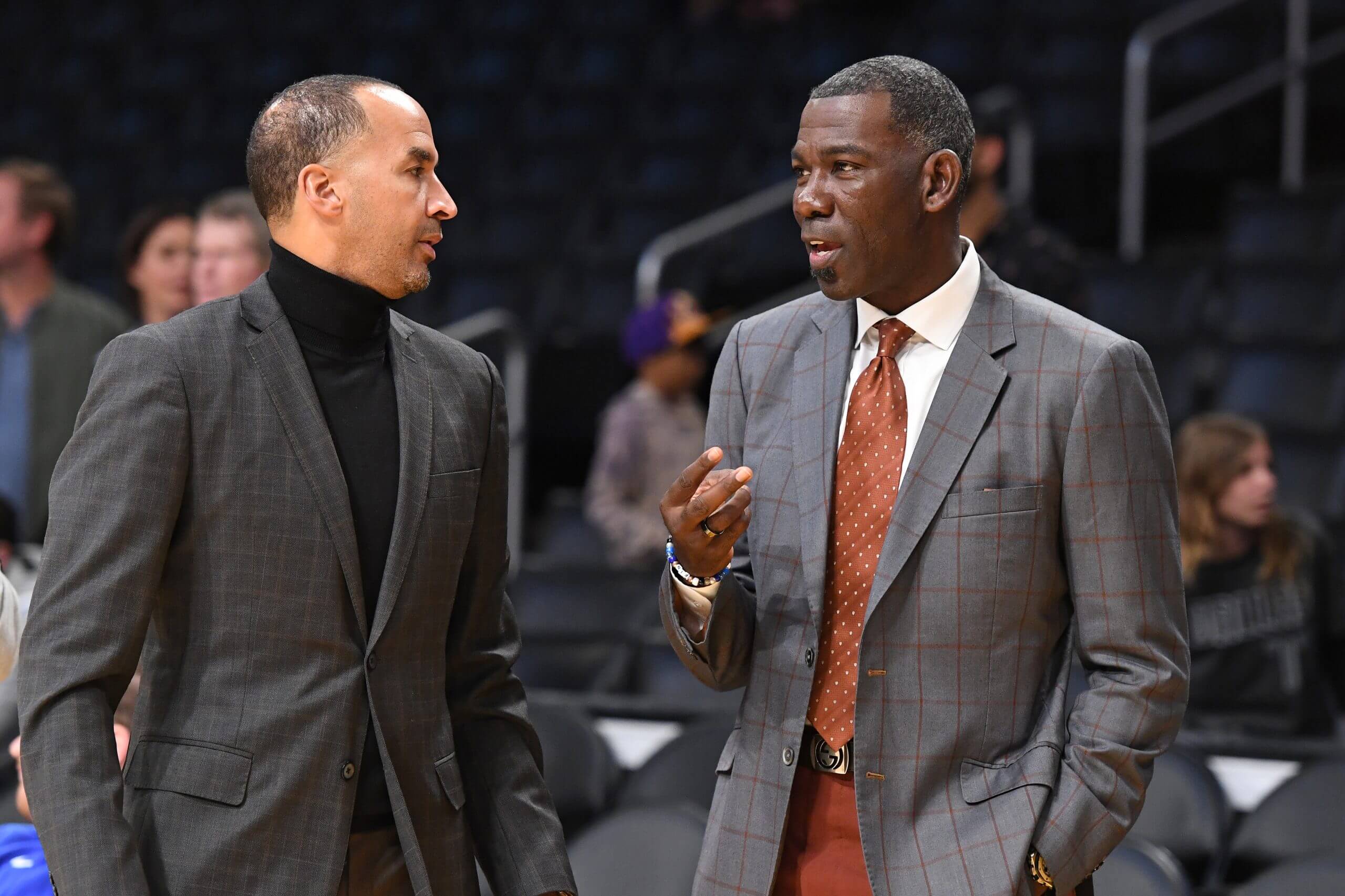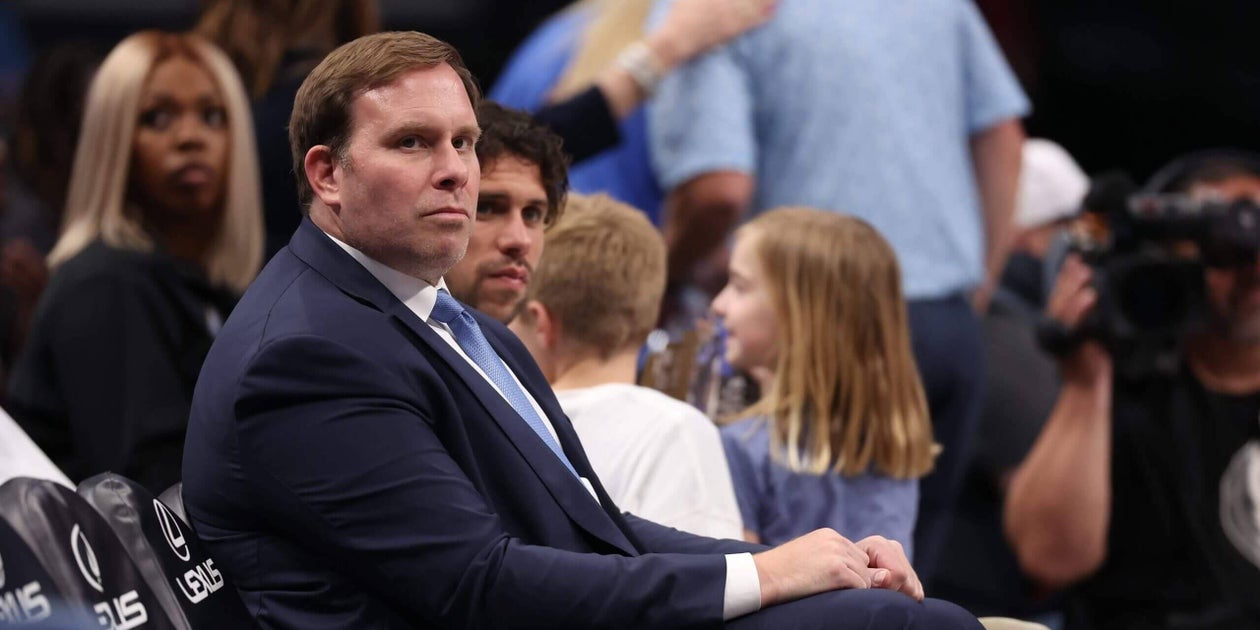Patrick Dumont strode through the American Airlines Center two hours before tip-off Monday flanked by four hulking security guards.
It felt like a show of force with all the muscle surrounding the Dallas Mavericks’ governor, like Dumont was on hand for his team’s game against the Milwaukee Bucks to lower the boom on someone. But before he did that, Dumont expressed remorse in a courtside chat with Nicholas Dickason, an 18-year-old Dallas native, about the Mavericks’ decision in February to trade Luka Dončić to the Los Angeles Lakers in exchange for Anthony Davis, a move that deeply wounded the team’s fan base.
Mavericks general manager Nico Harrison presented the trade idea to Dumont, who signed off on it.
Two hundred and eighty-two days later, after unrelenting chants of “Fire Nico” poured down from the rafters at Mavericks home games, missing the playoffs, three injuries to the star Harrison traded Dončić for, a shocking stroke of good luck in the draft lottery and then a disappointing start to this season, Dumont was ready to move on from his GM.
By the time Dumont flew to Dallas on Monday morning, plans to fire Harrison were already in motion, league sources said. There were more “Fire Nico” chants in the Mavericks’ loss to the Bucks on Monday night. Word began to circulate early Tuesday that Harrison was done. The Mavericks made it official in an 11:24 a.m. news release.
It’s a humbling time for Dumont, his wife, Sivan, and her mother Miriam Adelson — the ownership group that purchased majority shares of the Mavs from Mark Cuban for $3.5 billion in 2023 and was in control when the team reached the NBA Finals in 2024. Not even two years later, Dončić is averaging 37.1 points per game with the Lakers, the Mavs are in turmoil, and Harrison is out of a job.
In the immediate aftermath of the trade that is widely considered one of the worst in league history, Dumont had expressed almost blind faith in Harrison.
“In Nico we trust,” Dumont famously said at the time.
So how, in a nine-month span, did Dumont decide he was ready to unceremoniously dump Harrison?
Injuries to key players were undoubtedly a factor. But Harrison hurt his own standing by making bad hires; creating and fanning the flames of a public relations crisis; and, most of all, displaying shaky basketball decision-making. The Mavs put a roster on the floor to begin this season that severely lacked offensive creators, producing an eyesore on offense and sinking the team to the bottom of the Western Conference.
If only they hadn’t said goodbye to a generational talent who was one of the best of all time at that very thing.
“It’s the losing,” said a league source who spoke with Dumont about why Harrison was fired. “Can’t get off to a start like this (after making a trade like that) and survive.”

Anthony Davis, left, was the centerpiece of the Luka Dončić. But he’s struggled to stay on the court, exacerbating the Mavericks’ offensive challenges with Kyrie Irving (right) sidelined with an ACL injury. (Candice Ward/Getty Images)
The Mavericks are not just 3-8 overall, 2-5 at home and in 14th place in the Western Conference.
They are injured, miserable and playing through taunts in their home arena. Near the end of Monday’s loss to the Bucks, Mavs forward P.J. Washington was at the foul line needing to make all three shots to tie the game, and had to shoot them while fans chanted “Fire Nico.” He missed his second attempt, ruining any realistic chance Dallas had of extending the game. Washington placed the blame on himself, but privately, other Mavericks players have expressed that so far this season, it’s been easier for them to play on the road than at home.
Monday’s loss to the Bucks marked the sixth straight game Davis has missed with a left calf strain. Multiple league sources said Davis has tried to convince the Mavs to let him return to the court, and Harrison urged him to return, but the team’s medical staff forbade it, citing the potential for a torn Achilles if Davis returned too soon.
Kyrie Irving remains out with the torn ACL he suffered in March, and the player Harrison signed as a potential replacement, D’Angelo Russell, quickly fell out of favor with coach Jason Kidd. Flagg, a 6-foot-9 forward who never played the point in his lone college season at Duke, has been asked to do so for the Mavs — and it’s been ugly.
Going into Wednesday’s game against the Phoenix Suns, the Mavericks’ offensive numbers look putrid. They are last in the NBA in scoring and 3-point percentage. Russell is shooting 27.8 percent from 3, while future Hall of Famer Klay Thompson is converting 26.7 percent of his outside shots. Thompson started his first 79 games in a Mavericks uniform, but last week, Kidd began bringing him off the bench.
With the losing, the injuries and the negativity mounting, league sources said Dumont was hearing from the man whose choice to sell the team to him opened the door to this disaster in the first place. Cuban, who still owns 27 percent of the team, was known to be frustrated with Harrison for freezing him out after the sale and not consulting him on the choice to trade Dončic. League sources say he made his case to Dumont over the last several months that Harrison was steering the franchise in the wrong direction.
Reached by email, Cuban declined comment to The Athletic.
Making the same case, from a different angle, were Kidd and other team officials who were loyal to the coach. While it is unclear if Kidd ever uttered a direct plea to Dumont for Harrison’s removal, Kidd clearly was at odds with Harrison over the roster. In Dallas’ first seven games this season, Kidd decided not to start a traditional point guard. In the Mavericks’ second game of the season, Kidd stunningly played undrafted two-way signee Ryan Nembhard more minutes than Russell.
Last summer, Kidd contemplated leaving the Mavericks to go coach the New York Knicks. There was mutual interest between the two sides, league sources said, but the Mavericks refused to let Kidd leave and rewarded him with an extension. That gave Kidd power in any disagreement with his front office. He had more years on his contract than any of them.
“Smooth.”
That was how Ralph Greene Jr., a former Nike executive who spent 22 years with the company, remembered Harrison in his younger days.
That was also the word Russell used to describe Harrison in September at Mavericks media day.
If people in the basketball world view Harrison as a slick operator behind the scenes, publicly, Harrison has often come across as awkward and clumsy, which has made him an even easier target for criticism and, ultimately, blame.
Harrison’s rationale for trading Dončić for Davis, a 10-time All-Star, past NBA champion and Olympic gold medalist, was “defense wins championships.”
That message wasn’t well-received by the Mavericks fan base, which in 2011, watched a team built around one of the greatest offensive players in league history — Dirk Nowitzki — win a championship. Davis, a 6-10 big man with nimble feet who can protect the rim and guard on the perimeter, was the favorable comparison Harrison thought he was making to Dončić with that “defense” quote. But it fell flat because Davis, who was hurt when the trade went down, re-injured himself in his first game for the Mavericks on Feb. 8 and missed the next 18 games.

Dallas has asked No. 1 overall pick Cooper Flagg to play out of position as a point guard, a difficult assignment for the 18-year-old rookie forward. (Manuel Velasquez / Getty Images)
In June, after the Mavs had not only missed the playoffs but also lost Irving for the foreseeable future, Harrison addressed the media on draft night. The Mavericks had just selected Cooper Flagg No. 1 overall, earning the right to do so thanks to an NBA Draft lottery miracle. Harrison delivered two lines — “fortune favors the bold” and his declaration that “fans are finally starting to see the vision” — that further angered Mavericks fans. Harrison seemed to be taking credit for Dallas’ lottery luck, which Mavericks fans found nonsensical.
The Mavericks’ public messaging had been a problem for a while. Back in February 2024, the team hired a new head of public relations who held no previous experience in the field — Victoria Martinez, who came over from the FBI. Martinez’s area of expertise within the federal government was combatting terrorism. The transition to a top public relations role with an NBA team was rough. The Mavericks dealt with a string of public embarrassments starting in February, when Dončić was traded.
One of the most well-known gaffes was a closed-door question-and-answer session the team held in April. Harrison and CEO Rick Welts spoke on the record, but there was a catch: the Mavericks initially told reporters they weren’t allowed to record the meeting themselves. The Dallas local media pushed back, arguing that the Mavericks could change any of the answers that didn’t portray them in a positive light. So the Mavericks relented.
Five days before media day in September, the Mavericks fired Martinez as part of a broader restructuring in the department. Martinez, co-workers felt, had been set up to fail. She had been hired without adequate experience and then asked to do clean-up duty following the Dončić trade.
Multiple team sources told The Athletic it was illustrative of part of a larger pattern of Harrison’s poor hiring practices and perceived lack of accountability. In May, Harrison was forced to fire athletic performance director Keith Belton, who did not have proper certification from the National Strength and Conditioning Association, as first reported by ESPN. Earlier in the season, Belton had gotten into a heated argument with one of his superiors over the handling of Dereck Lively II’s return to the court. The incident was serious enough that it required the involvement of the human resources department.
Besides hiring unqualified people for important roles, Harrison also didn’t have much tolerance for anyone who disagreed with his way of doing things, multiple team employees told The Athletic. Casey Smith, the Mavericks’ long-time director of health and performance, was let go weeks before the start of the 2023-24 season. Smith was widely respected throughout the NBA and had strong relationships up and down the Mavericks’ roster. But he wasn’t retained, team sources said, in part because he sometimes pushed back on Harrison’s rigid way of doing things.
“If you offend Nico’s sensibilities any stretch of the way, that’s it,” one former team employee told The Athletic. “He’s a sensitive guy.”
The full extent of the damage done by the Dončić deal — both to the organization and the All-Star players who were impacted by it — won’t be known for years. Yet while Irving was able to enjoy some good times before it all fell apart, leading the Mavs to that 2024 finals run alongside Dončić while rehabilitating his reputation along the way, the same can’t be said for Davis and Thompson.
For Thompson, the 35-year-old who left the Golden State Warriors in the summer of 2024 for the chance to play with Dončić and contend for a title, he now finds himself in a far worse competitive position than the one he left behind. What’s more, the specific issue that caused such a divide between him and his old Warriors team — Thompson being asked to come off the bench as a sixth man — has returned anew. And the irony of it all, in terms of the free agency choice that brought him to Dallas, is that he likely would have been playing alongside Dončić with the Lakers right about now if only he’d known how this would turn out.
As was reported at the time, the Lakers and Thompson discussed a four-year, $80 million deal in free agency that — if the Warriors cooperated in a sign-and-trade — would have dwarfed the three-year, $50 million deal the Mavericks would eventually give him. But the allure of Dončić’s greatness was a major pull, as was the chance to partner with Irving in the backcourt. When given the choice between teaming up with the Lakers’ duo of Davis and LeBron James or the Mavericks’ stars, Thompson made a calculated decision to go with the latter. Little did he know that the star player swap to come would leave him on the wrong end of hoops history.
The 32-year-old Davis now finds himself at the center of league-wide speculation that he might be the next to go. He has two seasons left on his current contract, with a player option for the 2027-28 season worth $62.8 million, but is eligible for a three-year extension worth approximately $218.5 million this summer. Irving, whose contract runs concurrent with Davis’ (including a player option for $42.4 million in 2027-28), finds himself in a similar situation.
Yet Dallas is incentivized to bottom out this season, as their 2026 first-round pick is the last one they have until 2031. The prospect of reinvesting so massively in their older stars, in turn, comes with serious complications that could compel them to trade him. First things first, though, Dumont must decide who is going to make these sorts of front-office decisions in the future.

Michael Finley, right, a former All-Star for the Dallas Mavericks, was named co-interim general manager of the team after former GM Nico Harrison, left, was fired. (Andrew D. Bernstein / NBAE via Getty Images)
For now, former Harrison lieutenants Michael Finley and Matt Riccardi were promoted as interim co-general managers. Finley, 52, a 15-year NBA vet as a player who spent most of his career with the Mavericks, is most famous as an executive for taking the beer out of Dončić’s hands during the team’s celebration for reaching the finals in 2024. League sources said he was, at least initially, reluctant to accept the promotion.
Riccardi, 39, is a former mid-level front-office member of the Brooklyn Nets who joined the Mavericks in 2022 and was promoted to assistant general manager by Harrison the following year. If Riccardi is promoted as Harrison’s full-time successor, league sources said, it would be a clear sign of Kidd’s sway with Dumont and the organization.
Another potential replacement for Harrison is Dennis Lindsey, who currently serves as second in command to Trajan Langdon in the Pistons’ front office. Lindsey was an adviser to Harrison in Dallas in 2023-24, and is, according to league sources, Cuban’s preferred choice. If the Mavericks ultimately hire Lindsey out of Detroit, it would be a strong indicator that Cuban has re-established himself as a strong voice inside the Mavericks’ C suite and as someone with Dumont’s ear.
Nine months ago, Harrison and Harrison alone was who Dumont listened to. Perhaps the Mavericks’ governor heard Harrison loud and clear on Feb. 3, in Cleveland, the day after the trade when Harrison, in describing what he’d just done, said: “The future to me is three, four years from now. Ten years from now, I don’t know. They’ll probably bury me and J(ason Kidd) by then. Or we bury ourselves.”
For Harrison, it didn’t take nearly that long.
